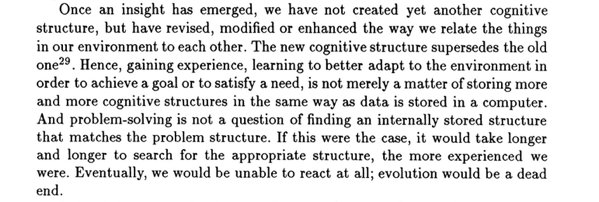speculative nonfiction
The loss of logical purity primacy

Back in February, my entire notion of expertise and how experts make decisions became cracked after listening to episode 169 of the Greater than Code podcast. While the podcast is rolling I’m discovering my socialized construction of expert – like we pump and grow some kind of muscled query power of an expanding brain-database over time. And that combined with a trained analytical rigor gained through extensive tutelage, study, and practice.
I’m struck by how neo-classical cyberpunk-capitalist fantasy that notion sounds: a techno-positivist outcome of brain as database; the privileging of expertise as accumulation. The time-value of memory perhaps.
It’s kind of wild: wondering about what sort of instinct decision-making really is in concrete terms. Thankfully we have the >Code crew to help us navigate Decision Theory from the safety of our own home. The podcast panelists offer a different notion attributed to Gary Klein’s work Sources of Power: How People Make Decisions. Rein’s paraphrasing of this more probable notion for quick decision under time pressure situations in our business environs:
Expertise is an act of rapid mental simulation without formal analysis based on previous experience. It’s more akin to “instinct” than a cartesian scientific methodology.
Gary Klein calls this model “recognition primed decision” or RPD. The key is that over time and through experience we continue to enhance our instincts around familiar problems, and replace outdated versions that don’t make sense in our newer model of the world. No need to increase disk/head space! Then, when facing a quick-decision moment, we can make a strong guesses. Informed guesses, not overly formal; certainly not grooved to dreams of electric sheep or Moore’s law or, by necessity, scholastic architectures of cognition. But not totally informaled, either; we are making smart connections.
I find RPD comforting as a way to rethink my role as an expert despite fewer than a decade of years practicing my trade: a sophomoric “mid-level” software engineer. While RPD reveals the distinctions between less experienced and more experienced people – notably the former’s exceeding alacrity to arrive at a first course of action – RPD is about evolving your pattern matching, identifying the least risky choice, mentally modeling/imagining outcomes (see Variations)
Embracing an RPD notion of expertise can ramify more permissions for less skilled SWEs to face spontaneously emerging decision-making moments in the workplace with less imposter syndrome and tougher felicity. Fellow career middlers, if you have an idea, basically just trust your power of . RPD also beseeches us to expel myths like (quickly riffing): Principal and Staff technologists have reached their eminent station by putting in the time to refine their powers of inspection, analysis, interpretation, evaluation; they’ve amassed all the good frameworks, methodologies, and systems into their memory bank; and decisions they make are conclusive (foreclosing, narrowly, the scope of possibility) because of this special toolkit which is wielded though an infallible reason.
Reason and logic might factor into RPD mental simulation, but there’s a primacy of imagination and knowing deep down. Strength of will even?
I am enough. My powers to decide can be totally excellent.
Of course, that doesn’t mean my first guess won’t be totally wrong. But hopefully I’m not asked to fix something urgent that far exceeds my bounded rationality of this domain; which might ramify harm on real people if the mark is missed, goddess forbid and forgive.
I did some additional reflection with the >Code community in their Slack on why I was feeling relieved by Klein’s ideas (Jessica Kerr hearted this so I’m feeling proud to share!):
Thanks. This really struck me because I think I have internalized some idea that experts have these academically rigorous approaches to problems where they draw on frameworks and data and tools blah blah to come to conclusions.
Then Rein chimes in:
Yeah, the analytic decision-making mode is what we are taught, but it’s not what people actually use, especially in high-pressure situations.
The me again:
Oh right that was the other piece. [Making decisions under] high pressure. Which in corporate culture feels like all the time a lot.
Then some other folks tried to pivot the conversation to talk about how web tech is not really that high “pressure” because bad decisions don’t kill people or necessarily tank the business immediately. So I continue:
I understand where y’all went with that idea of “high pressure.” But even without the kinds of excess you describe — which I’m grateful not to feel at my (fairly spread out) 1000 person company — I still feel like I’m caught up in a heavy stream; not in a surprising or terribly uncomfortable way; but like a tireless machine of ambient conversation between me and my work and my coworkers that is always humming. So maybe “high pressure” in the sense of constant. Day to day I feel coerced into what feels like quick/on-the-spot decision-making, and always on guard for such; and that’s definitely challenging for me.
Like, I’m a developer, and I have to make a ton of small decisions all day long when coding. Even medium-sized decisions. (Like the other day deciding whether to coordinate on a revision of a standard component with a team in Spain with similar needs, vs plowing ahead myself because I knew that process may take weeks and I needed output in days). And often these decisions have to happen within a matter of minutes because of the above normal buzz. I think I remember there was another episode where folks talked about how developers make more decisions than CEOs on any given day?
I was finding comfort in this idea from Gary Klein because I can consider whatever my instinct draws on in that moment to be a practice of expertise. I can feel like an expert; and without any added insecurity for a lack of analytical rigor, if I had to explain my decision. I usually have confidence in my decisions, but I didn’t have a framing of it as expertness. A framing I was likely lacking, as Rein said, because I’ve been taught a dichotomy between analytical thinking and instinct, where there actually isn’t one; at least as I understand the idea without having read the book yet. But as someone relatively new in the industry — just around 6 years building web — being able to come into expertise or see it forming in my behavior is really nice.
Earlier today, delving through Software Development and Reality Construction, I was delighted to discover another rebuke to my previous ideas of expertise as analytical reason qua database. It smacked of Klein and I wonder if Reinhard Keil-Slawik is influenced by Klein – or conversely – or perhaps they swarm with each other in that world of systems thinking, cybernetics, constructivism, etc…
From Keil-Slawik’s essay Artifacts in Software Design:

Keil-Slawik argues that expertise – ie “insight” – is an enrichening of “understanding.” Understanding being a cognitive structure derived from the encounter with our envionrment which mashes up phenomena (physical, etc…) and circumstance. It’s not random access from a brain-as-database that has been populated with arrangements of stuff from “out there” - outside ourself/mind – (previous cognitive structures); as if insight is just a result of recall or trial; that smacks of an easy slippage slide into decision paralysis.
Rather it’s:

This notion seems to gel well with RPD. I wonder if Klein would welcome this cognitive science to explain how we do decisions.
I’m tempted to accept this explanation pro-tem since the thought of unbounded accumulation of stuff in the brain, and lookup at exponential runtime, doesn’t satisfactorily explain the reliable guesses of experts under time pressure. This idea finds kinship with Nora Bateson’s characterization of sensemaking as Warm Data collection:
“For some reason, you know what it would feel like to put your tongue on the rug — you almost know what it would taste like. You have been gathering the contrasts, comparisons, and differences that give you that sensing since you were born, maybe even through the sense making of prior generations. You have no files for those data.” 🚀
Keil-Slawik and kin are proposing the idea of human expertise as an individual construction of meaning, as well as a co-constitutive emergence of our own body/mind wisdom and the “external memory” of symbols and tools we work with. The latter is an important point because it reinserts the importance of mneumonics as Turing machines, algebra, languages, frameworks, etc…. This affords us the benefit of a tradeoff: speed of resolution over perfectness. The example Keil-Slawik gives is of the ape who, if taught once to put sticks together to reach a banana, will subsequently devise similar means of combining objects to get the banana “without any hesitation…and any similar situation.”
Monday September 7, 2020